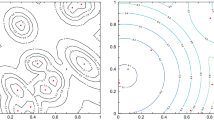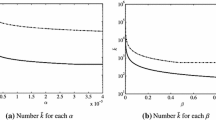Abstract
By far the most efficient methods for global optimization are based on starting a local optimization routine from an appropriate subset of uniformly distributed starting points. As the number of local optima is frequently unknown in advance, it is a crucial problem when to stop the sequence of sampling and searching. By viewing a set of observed minima as a sample from a generalized multinomial distribution whose cells correspond to the local optima of the objective function, we obtain the posterior distribution of the number of local optima and of the relative size of their regions of attraction. This information is used to construct sequential Bayesian stopping rules which find the optimal trade off between reliability and computational effort.
Similar content being viewed by others
References
R.W. Becker and G.V. Lago, “A global optimization algorithm”, in:Proceedings of the 8th Allerton Conference on Circuits and System Theory (1970).
H.C.P. Berbee, C.G.E. Boender, A.H.G. Rinnooy Kan, C.L. Scheffer, R.L. Smith and J. Telgen, “Hit-andrun algorithms for the identification of nonredundant linear inequalities” (1985), to appear inMathematical Programming.
C.G.E. Boender, A.H.G. Rinnooy Kan, L. Stougie and G.T. Timmer, “A stochastic method for global optimization,”Mathematical Programming 22, (1982) 125–140.
C.G.E. Boender and R. Zielinski, “A sequential Bayesian approach to estimating the dimension of multinomial distribution”, in: R. Zielinski, (ed.)Sequential Methods in Statistics (Banach Center Publications (vol. 16), PWN-Polish Scientific Publishers, Warsaw, 1982).
C.G.E. Boender and A.H.G. Rinnooy Kan, “A Bayesian analysis of the number of cells of a multinomial distribution,”The Statistician 32 (1983a) 240–248.
C.G.E. Boender and A.H.G. Rinnooy Kan (1983b), “Bayesian multinomial estimation of animal population size”, Report 8322/0, Econometric Institute, Erasmus University (Rotterdam, 1983b).
C.G.E. Boender “The generalized multinomial distribution: A Bayesian analysis and applications”, Ph.D. Thesis, Erasmus University, (Rotterdam, 1984).
L.C.W. Dixon and G.P. Szegö, eds.,Towards Global Optimisation (North-Holland, Amsterdam, 1975).
L.C.W. Dixon and G.P. Szegö, eds.,Towards Global Optimisation 2 (North-Holland, Amsterdam, 1978).
M.H. De Groot,Optimal Statistical Decisions (McGraw-Hill, New York, 1970).
A.H.G. Rinnooy Kan and G.T. Timmer, “A stochastic approach to global optimization”, Report 8419/0, Econometric Institute, Erasmus University (Rotterdam, 1984).
A.H.G. Rinnooy Kan and G.T. Timmer (1985), “Stochastic global optimization methods, Parts I & II”, Econometric Institute, Erasmus University (Rotterdam, 1985).
G.T. Timmer, “Global optimization: A stochastic approach” Ph.D. Thesis, Erasmus University (Rotterdam, 1984).
S.S. Wilks,Mathematical Statistics (Wiley, New York, 1962).
R. Zielinski, (1981), A statistical estimate of the structure of multiextremal problems,Mathematical Programming 21 (1981) 348–356.
Author information
Authors and Affiliations
Rights and permissions
About this article
Cite this article
Boender, C.G.E., Rinnooy Kan, A.H.G. Bayesian stopping rules for multistart global optimization methods. Mathematical Programming 37, 59–80 (1987). https://doi.org/10.1007/BF02591684
Received:
Issue Date:
DOI: https://doi.org/10.1007/BF02591684




